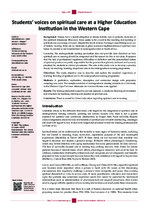| dc.contributor.author | Ntombizodwa, Linda S. | |
| dc.contributor.author | Klopper, Hester C. | |
| dc.contributor.author | Deliwe, Phetlhu | |
| dc.date.accessioned | 2016-09-19T09:00:46Z | |
| dc.date.available | 2016-09-19T09:00:46Z | |
| dc.date.issued | 2015 | |
| dc.identifier.citation | Ntombizodwa, S. L. et al. (2015). Students’ voices on spiritual care at a Higher Education Institution in the Western Cape, Curationis 38 (2): 1-9 | en_US |
| dc.identifier.issn | 0379-8577 | |
| dc.identifier.uri | http://hdl.handle.net/10566/2412 | |
| dc.identifier.uri | http://dx.doi.org/10.4102/curationis.v38i2.1520 | |
| dc.description.abstract | BACKGROUND: Nurses have a moral obligation to ensure holistic care of patients, inclusive of the spiritual dimension. However, there seems to be a void in the teaching and learning of spiritual care in nursing curricula. Despite the South African Nursing Council being in favour of holistic nursing, there are no measures in place to ensure implementation of spiritual care, hence its practice is not standardised in nursing education in South Africa. Currently, the undergraduate nursing curriculum does not provide clear direction on how spiritual care in nursing should be integrated and the reason for this is not clear. It appears that the lack of professional regulation, difficulties in definition and the personalised nature of spiritual practice are partly responsible for the practice being barely enforced and scarcely practised by students in clinical placements. The aim of the study was to develop a practice theory for teaching–learning of spiritual care in the undergraduate nursing programme.
OBJECTIVES: The study objective was to describe and explore the students’ experiencs of teaching–learning of spiritual care in the undergraduate nursing programme. Methods: A qualitative, explorative, descriptive and contextual design with purposive sampling was used. The sample consisted of undergraduate nursing students at a University in the Western Cape Province. Measures for trustworthiness were applied.
RESULTS: The findings indicated a need to provide support, a conducive learning environment and structure for teaching, learning and practice of spiritual care.
CONCLUSION: There is a need for formal education regarding spiritual care in nursing. | en_US |
| dc.language.iso | en | en_US |
| dc.publisher | Curationis | en_US |
| dc.rights | This is an open access journal which means that all content is freely available without charge to the user or his/her institution. Users are allowed to read, download, copy, distribute, print, search, or link to the full texts of the articles, or use them for any other lawful purpose, without asking prior permission from the publisher or the author. The article can be found online at: http://dx.doi.org/10.4102/curationis.v38i2.1520 | |
| dc.subject | Higher education institutions | en_US |
| dc.subject | Holistic nursing | en_US |
| dc.subject | Spiritual care | en_US |
| dc.subject | Student experience | en_US |
| dc.title | Students’ voices on spiritual care at a Higher Education Institution in the Western Cape | en_US |
| dc.type | Article | en_US |
| dc.description.accreditation | Department of HE and Training approved list | |

